Key takeaways:
- Conflicting values in advocacy highlight the need for compassion and understanding in discussions related to deeply personal beliefs, particularly in the pro-life movement.
- Pro-life advocacy extends beyond opposing abortion; it fosters a culture of support for families and addresses broader societal implications of choice.
- Navigating value conflicts requires active listening, seeking common ground, and educating oneself about opposing viewpoints to foster productive dialogue.
- Building consensus within pro-life circles necessitates empathy, collaboration, and an openness to diverse perspectives to strengthen the movement’s unity and impact.
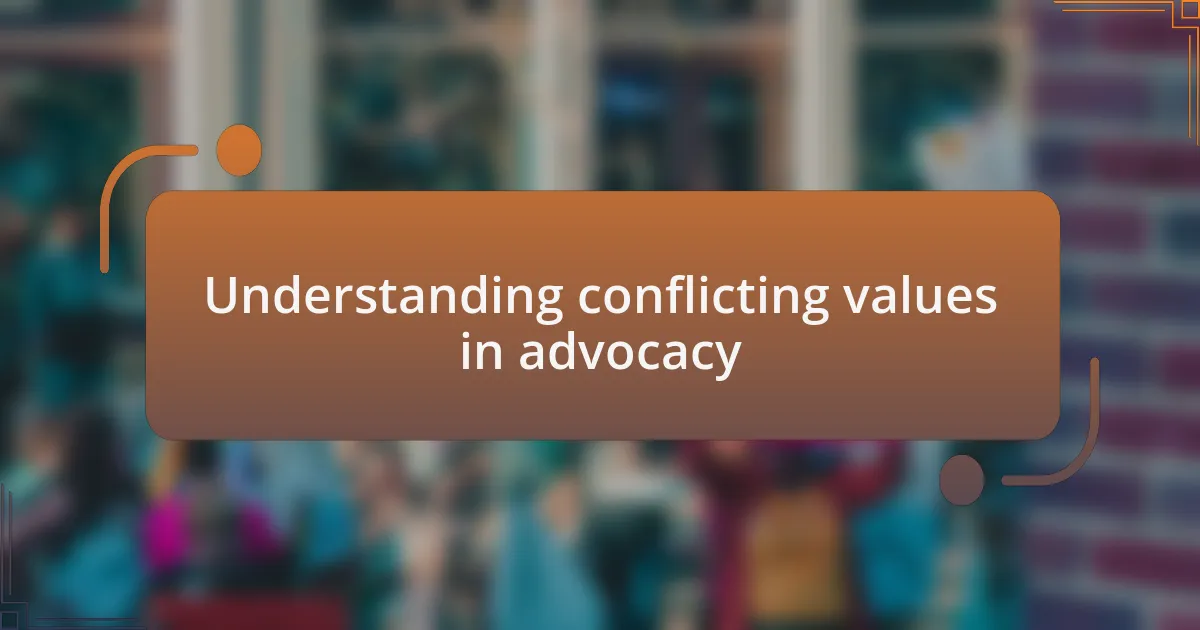
Understanding conflicting values in advocacy
In advocacy, particularly in the pro-life movement, conflicting values can create a complex landscape. I often find myself reflecting on how deeply personal beliefs can clash, leaving me to wonder: how can one hold firm to their convictions while respecting others’? This intricate interplay is crucial, as understanding differing perspectives can pave the way for meaningful dialogue.
One time, during a local advocacy meeting, I was struck by a fellow advocate’s story about their journey through loss. Their pain highlighted just how multifaceted issues surrounding life and choice can be. It made me realize that while my values are deeply rooted, acknowledging the emotional experiences of others helps foster a more compassionate perspective in discussions.
Navigating these conflicting values often prompts me to ask myself what it truly means to advocate for life. Is it enough to champion my beliefs without considering the contexts in which others make their choices? The answers are not always clear, but embracing this uncertainty can lead to a more profound understanding of the human experience.
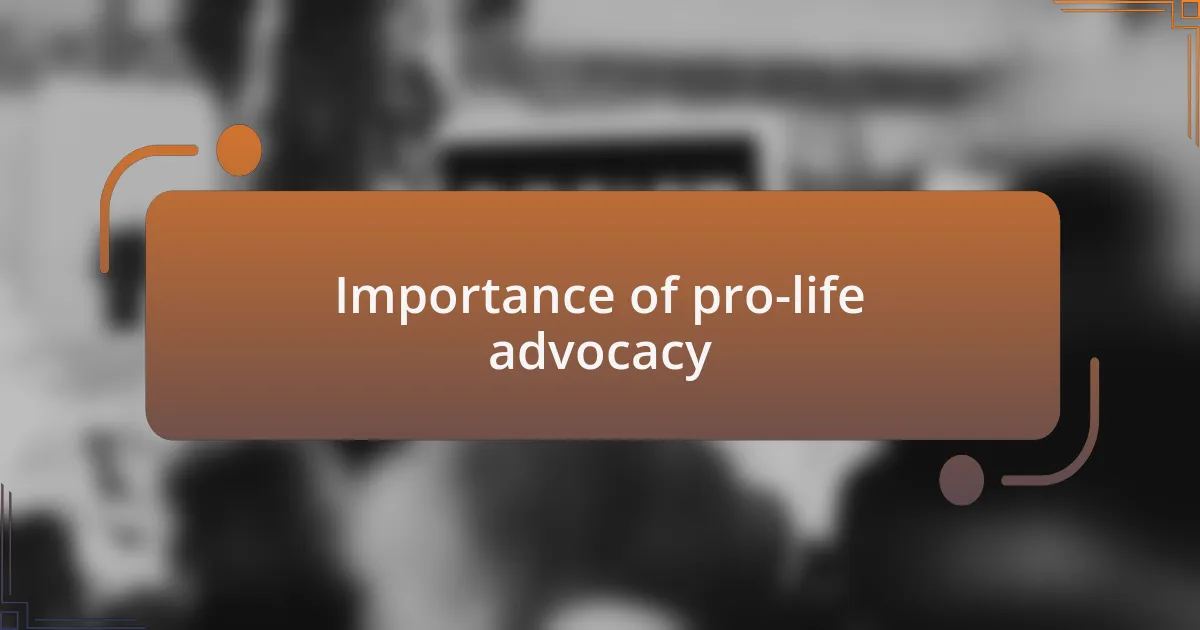
Importance of pro-life advocacy
Pro-life advocacy holds immense importance as it champions the inherent value of every human life. In my experience, this advocacy goes beyond simply opposing abortion; it fosters a culture of life that encourages support for families and the vulnerable. I’ve seen firsthand how local initiatives can offer tangible assistance, like counseling and care services, demonstrating a commitment to life that resonates with my core beliefs.
Moreover, the pro-life movement invites deep reflection on the societal implications of our choices. I often find myself considering how advocating for life challenges prevailing narratives that may dismiss the complexities of human experience. It’s a reminder that every decision impacts individuals and communities, urging us to create environments where all life is valued and nurtured.
It’s essential to recognize that pro-life advocacy is not just about declaring a stance; it’s about engaging in a conversation that seeks to understand and uplift. I recall a moment where one compassionate dialogue led to an unexpected alliance with individuals who initially opposed my views. That experience solidified my belief that the importance of this advocacy lies in its potential to bridge divides and promote respect for life in all its forms.
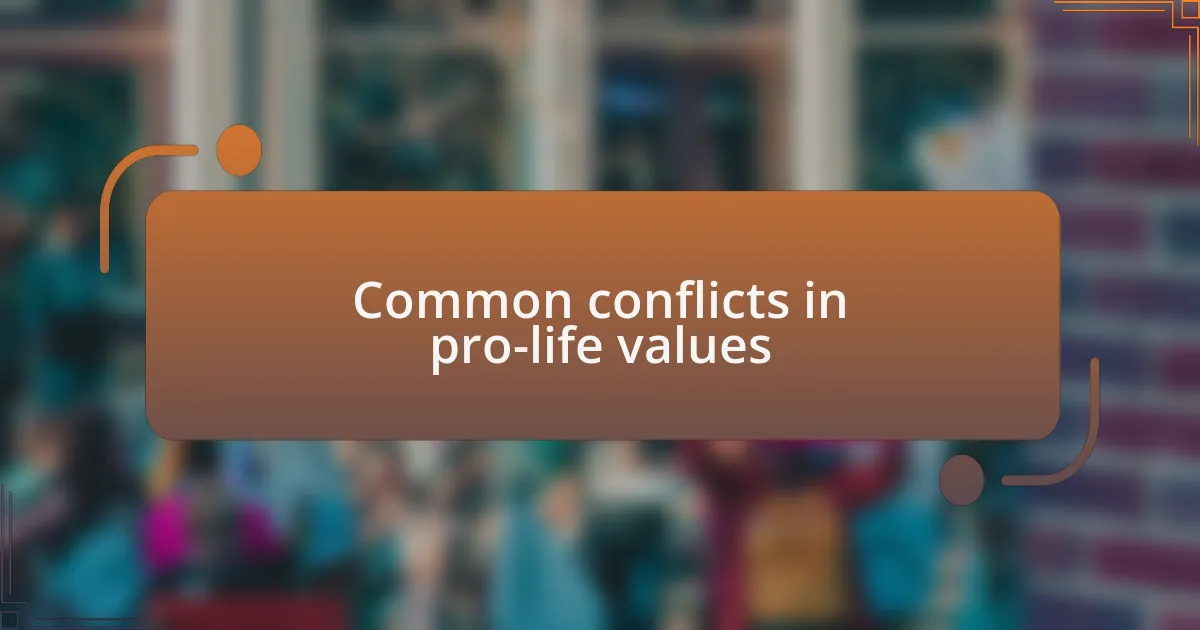
Common conflicts in pro-life values
Conflicts often arise when pro-life values intersect with personal beliefs about bodily autonomy and individual choice. I remember a heated discussion with a close friend who felt that a woman’s right to make decisions about her body should take precedence over the fetus’ rights. It made me realize how deeply personal our values can be and how those values can collide in unexpected ways.
Another area of conflict is the approach to addressing unwanted pregnancies. I’ve encountered differing opinions on whether to prioritize prevention through education or support for women in crisis situations. I find myself pondering: how do we strike a balance between offering comprehensive support and respecting the deeply held beliefs surrounding life and choice? It’s a complex dilemma that challenges advocates to find common ground.
Moreover, there’s often tension between pro-life advocacy and the policies implemented to support families. For instance, many advocates may focus on the unborn but fail to engage robustly with issues like parental leave or affordable childcare. This oversight has left me questioning whether our efforts to protect life are equally matched by our commitment to nurturing and supporting those lives once they are here. It’s an ongoing dialogue that I’m passionate about, as addressing these inconsistencies can lead to stronger advocacy.
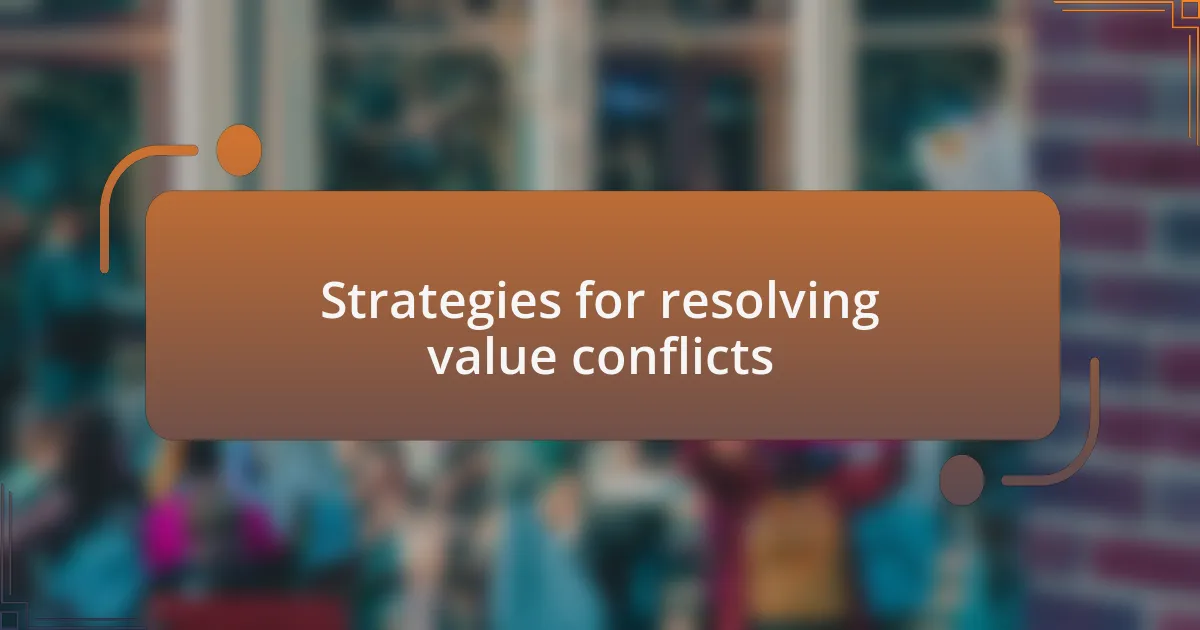
Strategies for resolving value conflicts
Navigating value conflicts requires active listening and empathy, as I’ve often realized through my own discussions. In a recent community forum, I encountered people with opposing viewpoints who were passionate yet respectful. It reinforced my belief that recognizing the emotional weight behind each stance can foster understanding, allowing for more productive conversations.
One strategy I find effective is seeking common ground. During a conversation about comprehensive healthcare, I discovered that many had similar goals but varied paths to achieving them. By focusing on shared objectives, such as reducing maternal mortality or promoting adoption, we were able to shift the dialogue from disagreement to collaborative problem-solving. This approach not only reduces tension but can often spark innovative solutions.
Additionally, I believe it’s crucial to educate ourselves about the opposing viewpoints. After participating in workshops that brought in diverse perspectives, I found my ability to discuss topics like reproductive rights grew immensely. It made me question: how often do we engage with ideas that challenge our own? By embracing different narratives, we can create a richer understanding of complex issues and ultimately find more harmonious resolutions to our conflicts.
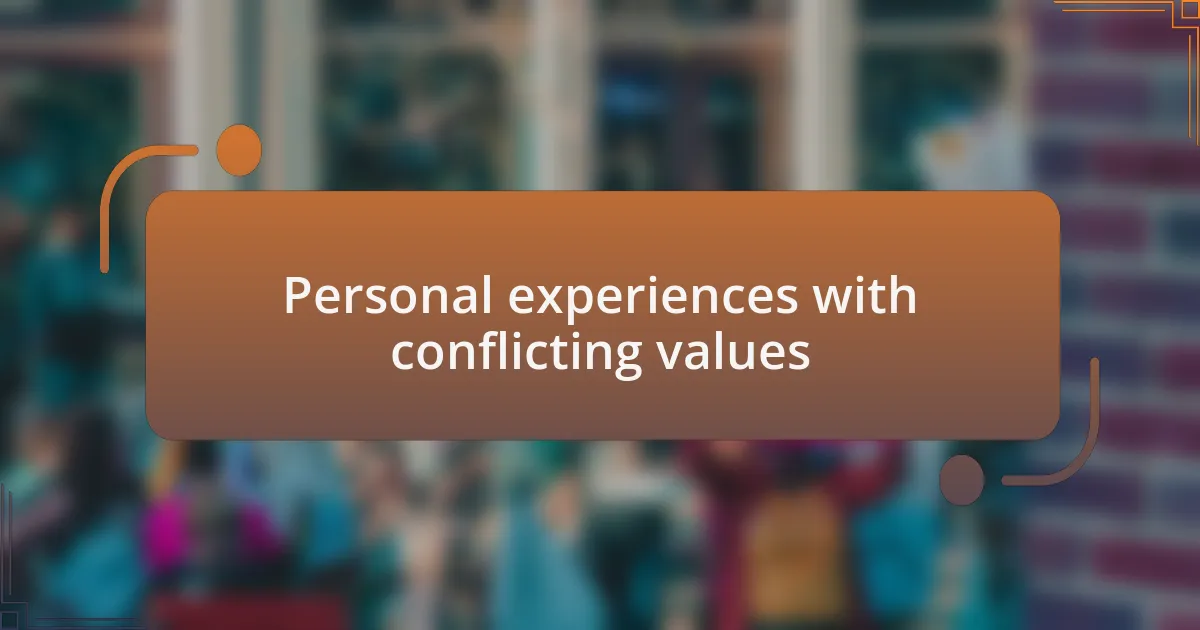
Personal experiences with conflicting values
I remember a time when I was at a family gathering, and the conversation turned to the topic of abortion. As a staunch pro-life advocate, I felt a surge of conflict when my cousin, who I deeply admire, expressed a more liberal stance. It tugged at my heartstrings to consider her perspective—she spoke passionately about women’s rights and personal agency. In that moment, I realized how vital it is to balance my beliefs with compassion and understanding for those I care about.
One Saturday, I attended a local debate organized by different community groups. I was surprised to see how divided emotions could be. I felt a knot in my stomach as tensions rose between speakers. Yet, at one point, a participant shared her experience of losing a child, which changed the tone completely. It hit me—real stories often hold the key to bridging gaps in values. I thought, how could I remain steadfast in my beliefs while also honoring the unique pain others carry?
There was a point in my journey when I wrestled with the discomfort of confronting conflicting values in my own belief system. I had a mentor who challenged me to reflect on my definitions of life and morality. I often ask myself, how can I advocate for what I believe while remaining open to understanding the nuances of others’ experiences? This introspective process helped me embrace the complexity of these discussions and reinforced the importance of dialogue that respects diverse perspectives.
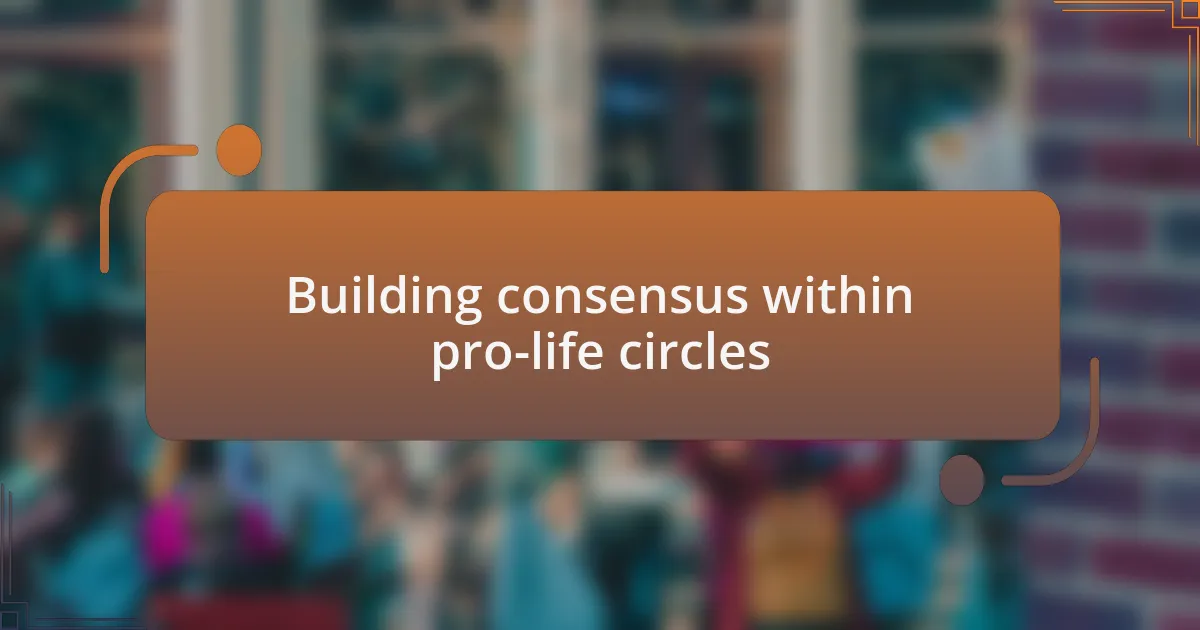
Building consensus within pro-life circles
Building consensus within pro-life circles often requires navigating a minefield of differing opinions and emotional ties. I recall a roundtable discussion with fellow advocates where we sat down to hash out our viewpoints. It was enlightening yet challenging; despite our shared commitment to the pro-life cause, we found ourselves debating strategies that felt fundamentally different in approach. This experience taught me that even among close allies, finding common ground means being open to listening and willing to compromise, regardless of how uncomfortable that might feel.
There was a moment during that discussion when a newcomer expressed doubts about our methods. Instead of dismissing her concerns, we paused and invited her to elaborate, creating an invaluable opportunity for dialogue. I learned that these moments of vulnerability are crucial; they allow us to reaffirm our values while also considering the input of others within our movement. I often wonder—how can we truly claim to advocate for life if we’re not extending that same grace and respect to one another?
Over time, I’ve realized that building consensus often comes down to embracing a spirit of empathy and collaboration. I attended a workshop where we practiced finding shared goals instead of focusing solely on our differences. It was refreshing to witness how small shifts in conversation could lead to a greater unity of purpose. In such settings, I find myself asking: how can we harness our distinct voices to foster a stronger, more inclusive pro-life narrative? It’s through these collaborative efforts that I believe we can amplify our message and, in turn, make a more significant impact.